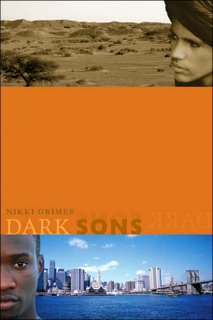
I read cover copy fairly often when picking up a book in the library. I scrutinize the covers and glance through the first chapter before chucking it into my book bag. However, for YA books, I usually have 'quick picks' -- ten random books that I simply pick up without examination. It doesn't always work out, but every once in awhile I find some amazing books serendipitously.
That happened last week. I picked up Nikki Grimes' Dark Sons, and found a wealth of emotional complexity and depth in prose poem form. This YA novel is about two boys, Sam and Ishmael, whose fathers have abandoned them. Sam, in the modern world, is aching as his father leaves he and his mother for a younger blonde Caucasian woman. Ishmael, a desert boy in biblical times, is devastated by the tension between his mother Hagar, a second wife, and his father's first wife, Sarah, who loves him yet persecutes him for not being a child of her own flesh, though he is his father Abraham's heir. And then, for both boys, the worst happens -- another child, a son is born. Both boys wonder who their fathers will love more now.
The chapters dealing with Ishmael include selections from Hammurabi's Code to give them more context. Ishmael and his mother are slaves in Biblical times. Ishmael's sections are especially poignant, as his father Abraham's descendents have been promised to him by his father's God. What does that promise mean when it becomes clear that he may not be the 'promised' descendant? Ishmael's poems express his pain, confusion, and love: "Half Chaldean./Half Egyptian./Half slave./Half free./Half loved./Half hated./Half blessed./All me." His story is set against the background of nomadic desert life, always in the context of his father, and his father's God's plans for, him.
Book Two gives modern-day Sam from Brooklyn his say: "black man breaks/black woman's heart/to marry white witch." He's betrayed by his father, frustrated by what he sees as passivity in his mother, and infuriated by his stepmother's friendly advances. Yet each boy finds their feet; Sam, in his band and with friends at church, Ishmael, in the desert at last when he and his mother leave Abraham and Sarah for good. Both boys fall in love with their little brothers, even though they both see their fathers taking hold of tiny hands and leaving them behind.
The roots of three world religions come from Abraham's complex descendents, so this story has reverberations far beyond the average in a YA book. The poetry is lyrical and the emotions are direct. That both boys mature so much in a sort of spiritual way despite betrayal makes this a powerful both yet hopeful book, and well worth a serendipitous toss into the book stack.

No comments:
Post a Comment